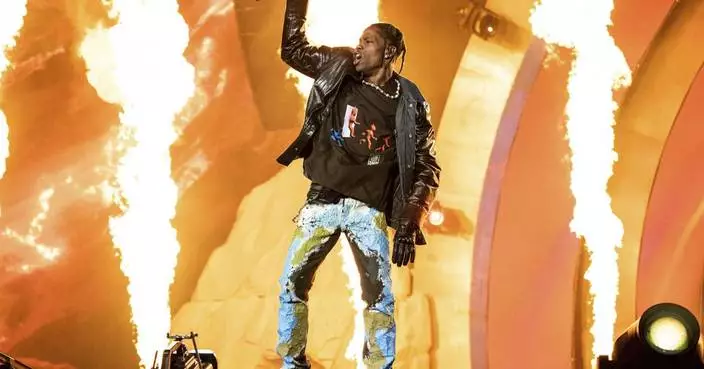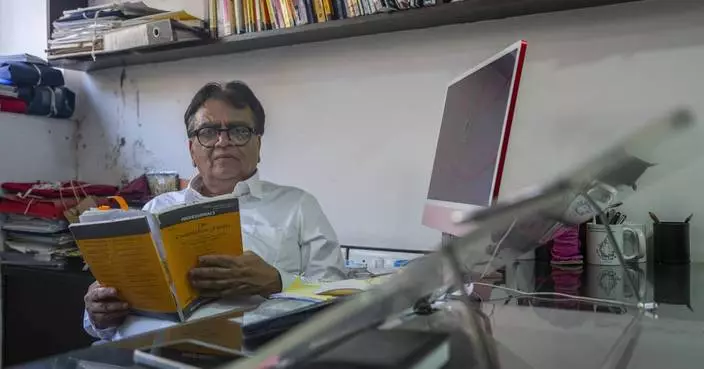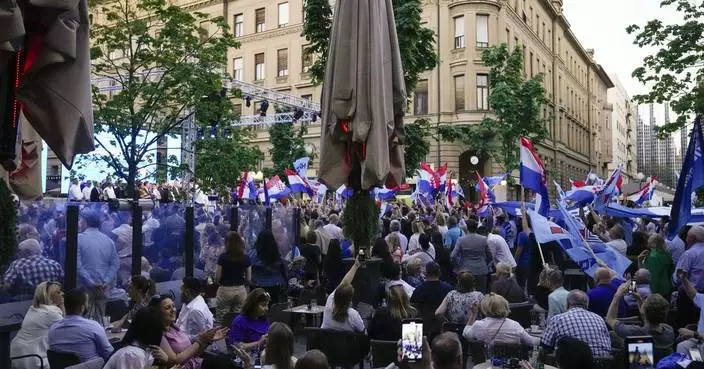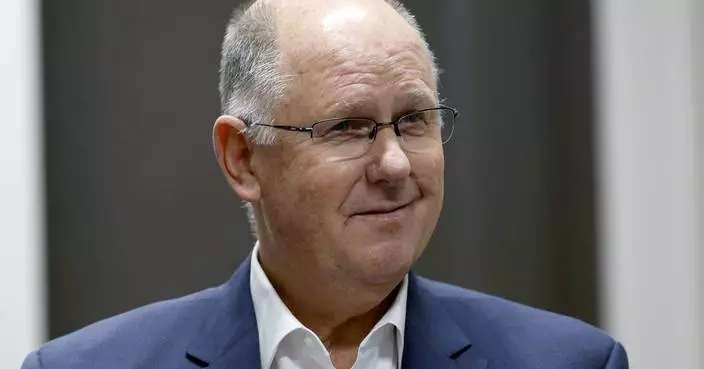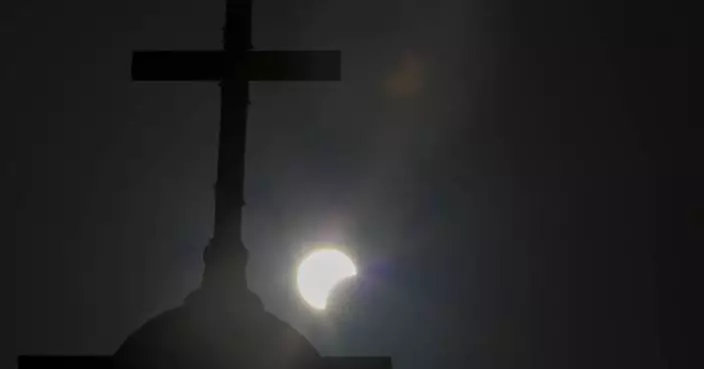In the Balkans, soccer is so political that it has created bitter divisions about Croatia's surprising success at the World Cup.
The team will face France in the tournament final in Moscow on Sunday, provoking mixed reactions and strong emotions in the region scarred by war.
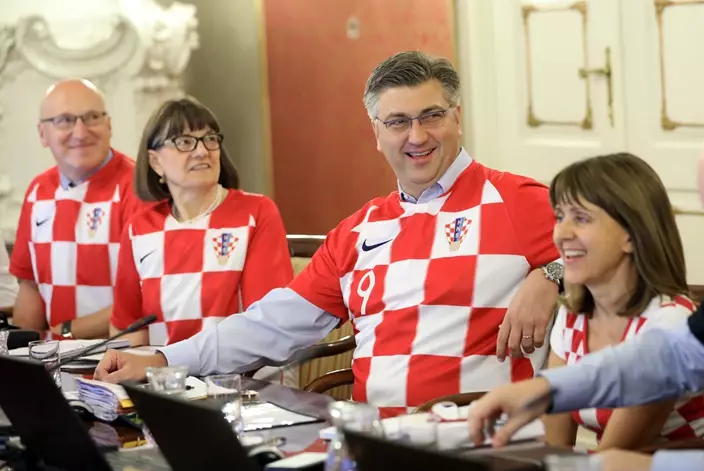
Croatia's Prime Minister Andrej Plenkovic, center, sits between ministers wearing Croatian national soccer team jerseys during a government session in Zagreb, Croatia, Thursday, July 12, 2018, a day after Croatia qualified in finals at the soccer World Cup. (AP Photo)
From Montenegro and Serbia in the east and Slovenia in the west, Croatia's neighbors have been split over whether to support Croatia or France, reflecting the persisting rifts stemming from the 1990s conflict.
While many in those nations have expressed pride and joy that a Balkan country has made it to the final, Croatia's stellar achievement also has caused envy and nationalist outbursts evoking the war era.
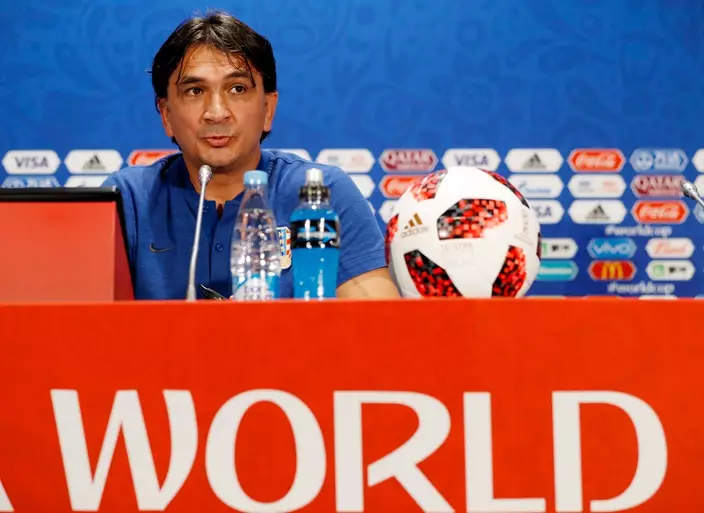
Croatia head coach Zlatko Dalic answers a question during a news a press conference at the 2018 soccer World Cup in Moscow, Russia, Thursday, July 12, 2018. (AP Photo/Darko Bandic)
"The World Cup generally is a joyful event, but we in the Balkans somehow manage to turn even ball-kicking into a clash," said Draza Petrovic, an editor at the liberal Danas daily in Serbia.
Petrovic said that sports rivalry was also strong among the Balkan nations even while they were all part of the former Yugoslavia, when it was also rare to see Serbian or Croatian teams support one another. But he added that the former federation's bloody breakup turned sports competitiveness into something more.
"The wars were not so long ago, so people view things not just as sports," he said of the conflict that tore the former Yugoslavia into pieces and in which more than 100,000 people were killed.
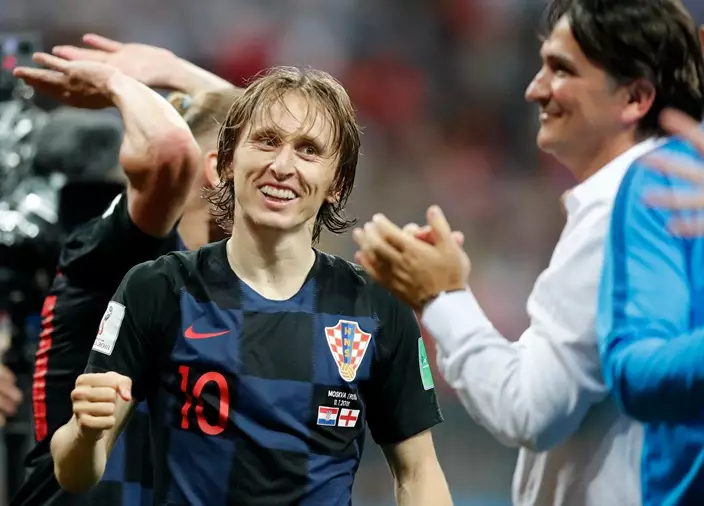
Croatia's Luka Modric celebrates with head coach Zlatko Dalic after advancing to the final during the semifinal match between Croatia and England at the 2018 soccer World Cup in the Luzhniki Stadium in Moscow, Russia, Wednesday, July 11, 2018. (AP Photo/Frank Augstein)
Nearly three decades after the war, a number of unresolved issues still plague relations among the former Yugoslav republics, while nations stick to their own versions of what happened and who were the victims.
Illustrating postwar tensions, Serbia President Aleksandar Vucic said publicly that he would support Slavic ally Russia over Croatia in the quarterfinals, and the foreign minister openly backed England in the semifinal.

Croatia's Luka Modric, left, and England's Marcus Rashford challenge for the ball during the semifinal match between Croatia and England at the 2018 soccer World Cup in the Luzhniki Stadium in Moscow, Russia, Wednesday, July 11, 2018. (AP Photo/Frank Augstein)
Even Serbia's most-adored sportsman, tennis star Novak Djokovic, has faced criticism from a nationalist lawmaker after openly supporting Croatia, while the issue triggered a heated for-and-against debate on social networks and in the media.
Petrovic noted that "those divisions are bad, particularly if fueled by the state media and top officials, including the president."
Some Serbs — whose team didn't make it past the group stage — joked about Croatia being a better team, with a popular post on social media declaring that Serbia's biggest success recently in soccer was being a neighbor to a World Cup finalist.
Croatia coach Zlatko Dalic has thanked Balkan countries after his team's win over England, saying that "the whole region is supporting us and of course this is normal."
Croatia also has many supporters among Bosnia's three main ethnic groups — Croats, Serbs and Muslim Bosniaks — that fought against each other during the country's bloody 1992-95 war.
In Slovenia, generally a Croatian ally but with a looming border dispute, hundreds of supporters are expected to travel to Croatia to join street viewing of the match on Sunday. This prompted the Croatian railway company to introduce more trains and ticket discounts.
One supporter from Slovenia congratulated Croatia on its victory against England, noting that: England wanted Brexit and they got it!
In Montenegro, the national divide over the country's loyalty to Orthodox Christian and Slavic neighbor Serbia, was reflected in the support for Croatia:
"There is no way I could back Croatia because they are our enemies," declared Milan Bulatovic, from Podgorica, the Montenegrin capital.
But retiree Igor Nikolic, also from Podgorica, told The Associated Press that when Croatia beat England to make it to the final "I felt as if my old dream of Yugoslavia at the top has come true."
ZAGREB, Croatia (AP) — Croatia 's governing conservatives convincingly won a highly contested parliamentary election Wednesday, but will still need support from far-right groups to stay in power, according to the official vote count.
The election followed a campaign that centered on a bitter rivalry between the country's president and prime minister.
The ballot pitted the ruling conservative Croatian Democratic Union, or HDZ, led by Prime Minister Andrej Plenkovic, against an alliance of centrist and left-wing parties informally led by populist President Zoran Milanovic and his Social Democratic Party, or SDP.
With over 90% of the ballots counted, the state electoral commission said that the HDZ won 60 seats in the 151-seat parliament. The SDP got 42 seats. The far-right Statehood Movement was third, with 14 seats, making it a kingmaker in future talks for the next government.
“Starting tomorrow morning, we will start forming a new parliamentary majority in order to form our third government," Plenkovic said in his victory speech. “I want to congratulate the other parties that were defeated by the HDZ.”
Turnout was more than 50% — a record — hours before the polls closed.
The election was held as Croatia, a European Union and NATO member, struggles with the highest inflation rate in the eurozone, a labor shortage, illegal migration and reports of widespread corruption.
At stake in the race for Croatia’s 151-seat parliament wasn't just the Adriatic Sea country's future domestic policies, but also the EU’s unity as it grapples with the instability from Russia’s full-scale invasion of Ukraine.
If the HDZ stays in power as expected, the country would continue on a pro-Western course in supporting Ukraine in its fight against Russia. Success for SDP could put it on track for victory in the European Parliament election in June and the presidential election in December. It would shake the HDZ’s long dominance of politics and potentially open space for stronger pro-Russia influence in the country, akin to Hungary and Slovakia.
The HDZ has largely held office since Croatia gained independence from the former Yugoslavia in 1991. The Balkan nation became the newest member of the European Union in 2013, and joined Europe’s passport-free travel area and the eurozone last year.
The president holds a largely ceremonial role in Croatia, while the prime minister exerts most of the political power. The election has played out as the final episode in a long-running rivalry between Plenkovic and Milanovic.
After Milanovic scheduled the election and announced his surprise bid for prime minister, he began campaigning on behalf of the SDP. But Croatia’s constitutional court judges stepped in, saying the move was unconstitutional.
The judges said that the president can’t run for prime minister, take part in the parliamentary election or campaign in favor of any party, unless he first resigns.
Milanovic refused, openly ignoring the top court and continuing to campaign in favor of the left-wing alliance
Milanovic has accused Plenkovic and the HDZ of rampant corruption and “massive theft” of state funds, referring to past and present scandals, some of which had ended up in the courts.
Plenkovic, who has led the government since 2016, repeatedly denied the accusations, saying Milanovic as the prime minister would shift the country away from the EU and closer to Russia.
Milanovic has often voiced a pro-Russia stance during the war in Ukraine, opposing the training of Ukrainian soldiers in Croatia as well as sending weapons to Ukraine because, in his view, it only prolongs the war. He also criticized the EU’s policies over Ukraine.
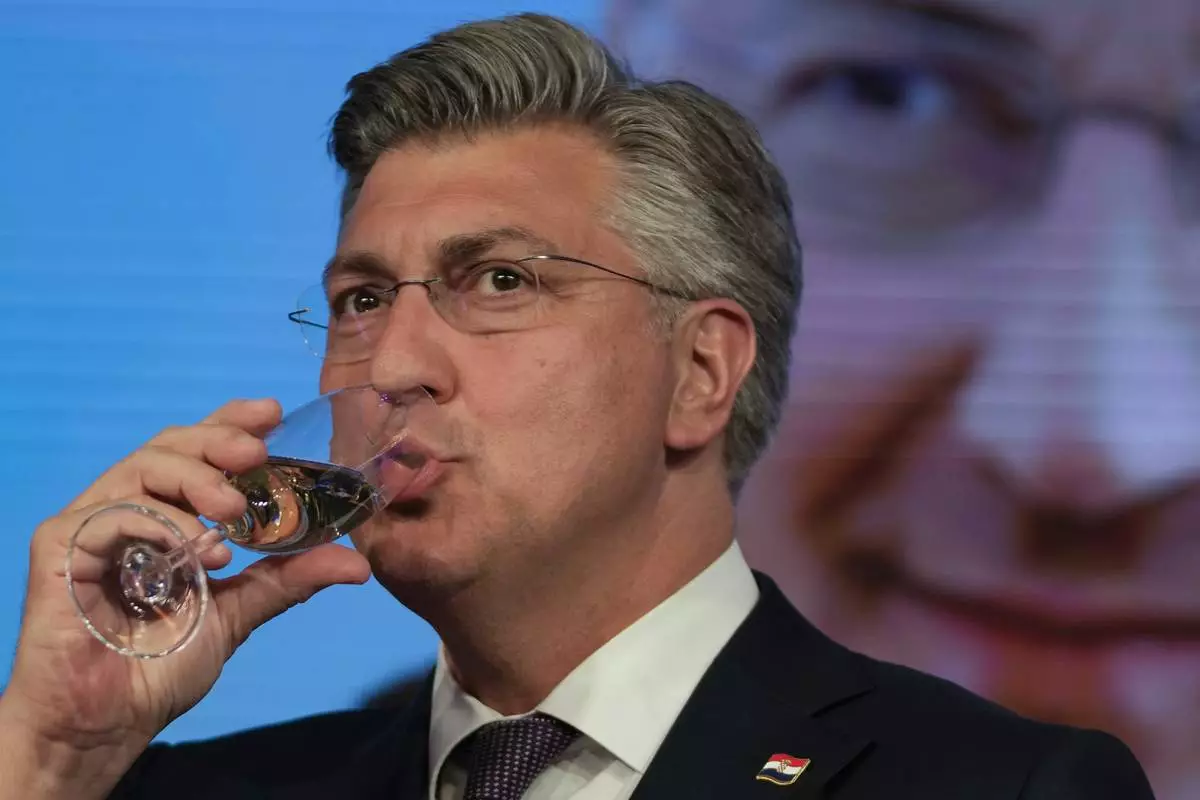
Prime Minister incumbent Andrej Plenkovic toasts with a glass of champagne after claiming victory in a parliamentary election in Zagreb, Croatia, Thursday, April 18, 2024. Croatia's governing conservatives convincingly won a highly contested parliamentary election Wednesday, but will still need support from far-right groups to stay in power, according to the official vote count. The election followed a campaign that centered on a bitter rivalry between the country's president and prime minister. (AP Photo/Darko Vojinovic)
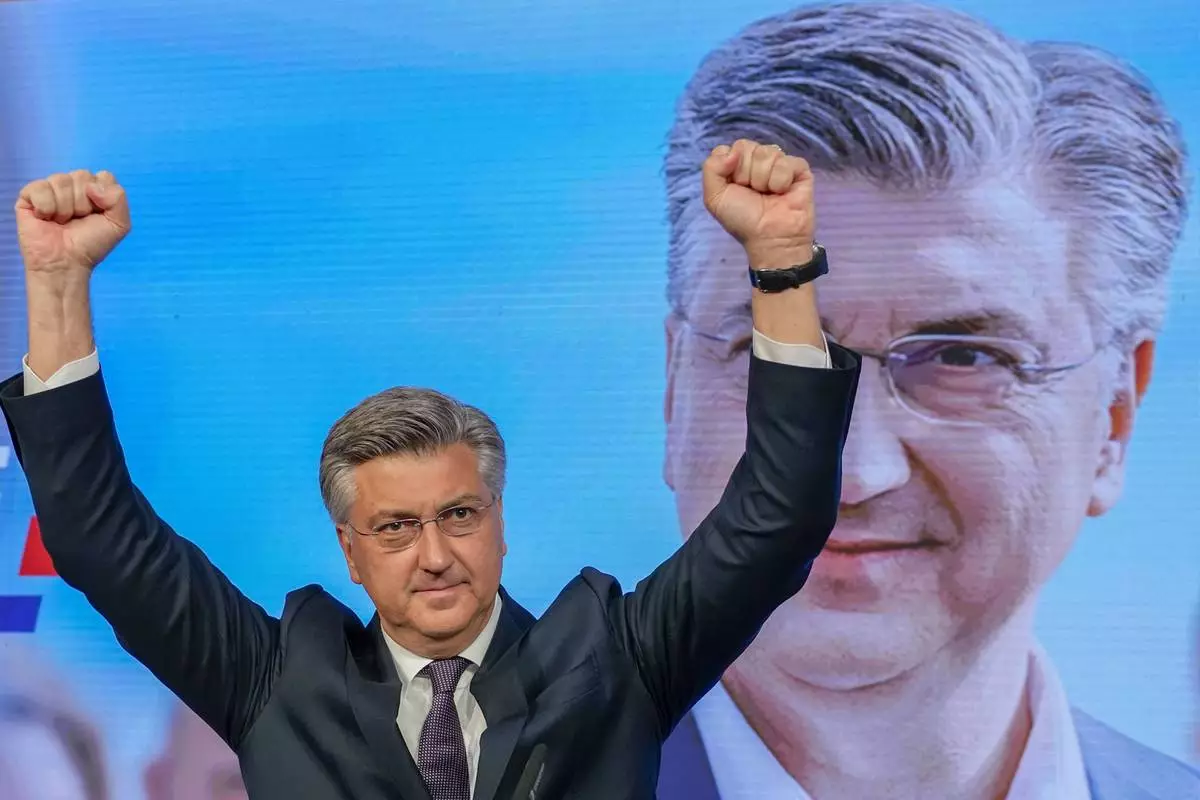
Prime Minister incumbent Andrej Plenkovic waves after claiming victory in a parliamentary election in Zagreb, Croatia, Thursday, April 18, 2024. Croatia's governing conservatives convincingly won a highly contested parliamentary election Wednesday, but will still need support from far-right groups to stay in power, according to the official vote count. The election followed a campaign that centered on a bitter rivalry between the country's president and prime minister. (AP Photo/Darko Vojinovic)
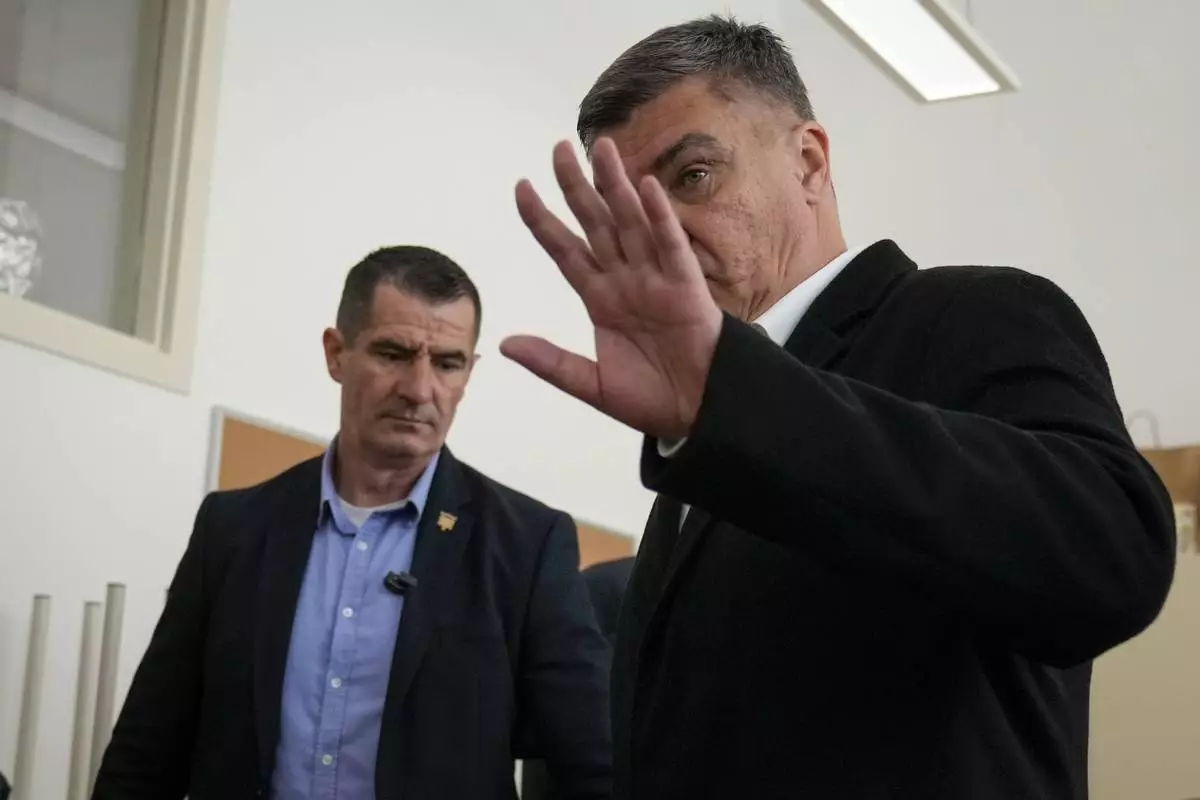
Croatia's President Zoran Milanovic, right, waves after casting his vote at a polling station in Zagreb, Croatia, Wednesday, April 17, 2024. Croatia is voting in a parliamentary election after a campaign that centered on a bitter rivalry between the president and prime minister of the small European Union and NATO member. (AP Photo/Darko Bandic)
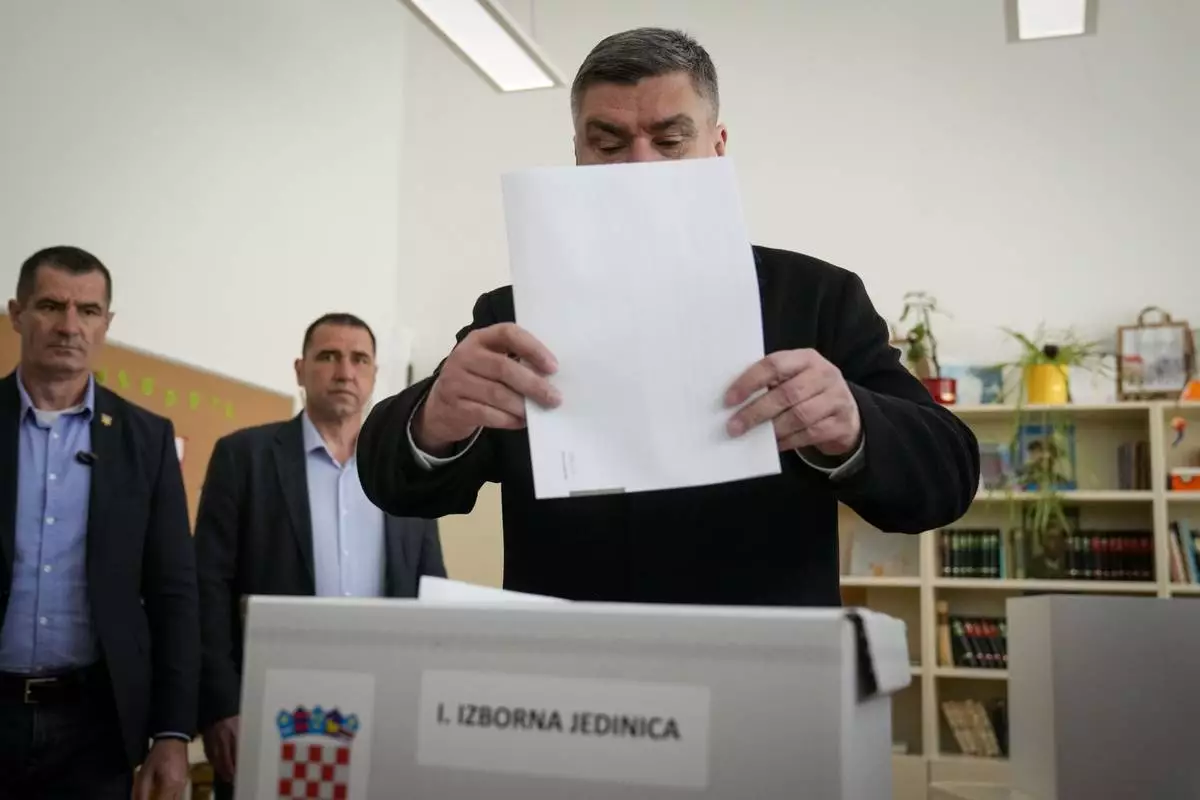
Croatia's President Zoran Milanovic casts his ballot at a polling station in Zagreb, Croatia, Wednesday, April 17, 2024. Croatia is voting in a parliamentary election after a campaign that centered on a bitter rivalry between the president and prime minister of the small European Union and NATO member. (AP Photo/Darko Bandic)
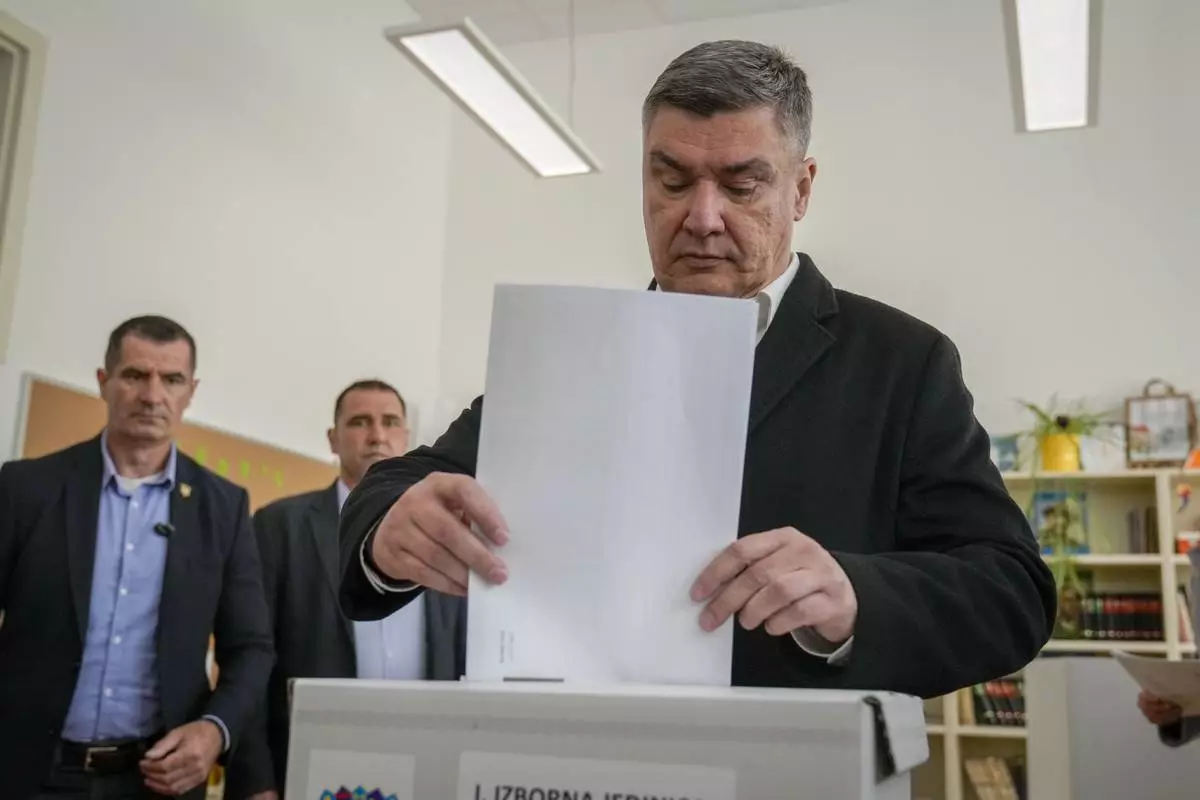
Croatia's President Zoran Milanovic casts his ballot at a polling station in Zagreb, Croatia, Wednesday, April 17, 2024. Croatia is voting in a parliamentary election after a campaign that centered on a bitter rivalry between the president and prime minister of the small European Union and NATO member. (AP Photo/Darko Bandic)
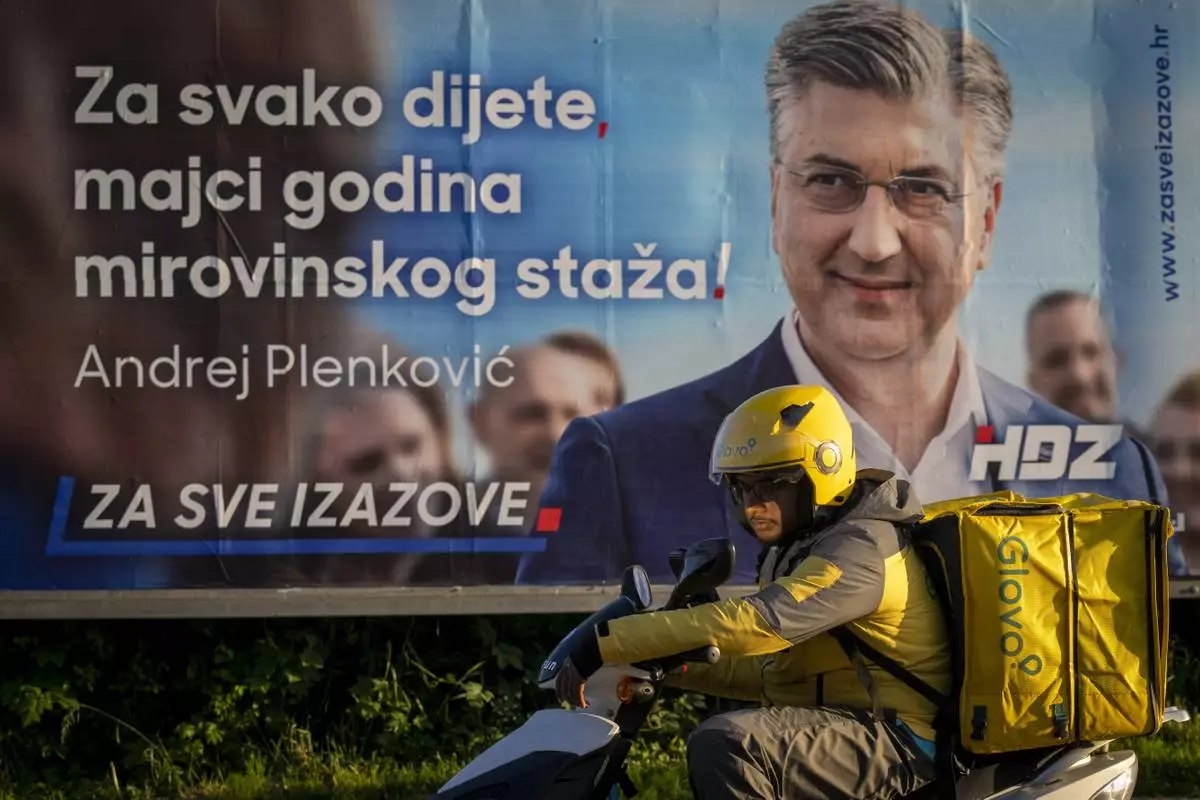
A delivery man waits for green light on a street in front of an election poster in Zagreb, Croatia, Sunday, April 14, 2024. Croatia this week holds a parliamentary election following a campaign that was marked by heated exchanges between the country's two top officials, creating a political crisis in the Balkan country, a European Union and NATO member state. (AP Photo/Darko Bandic)
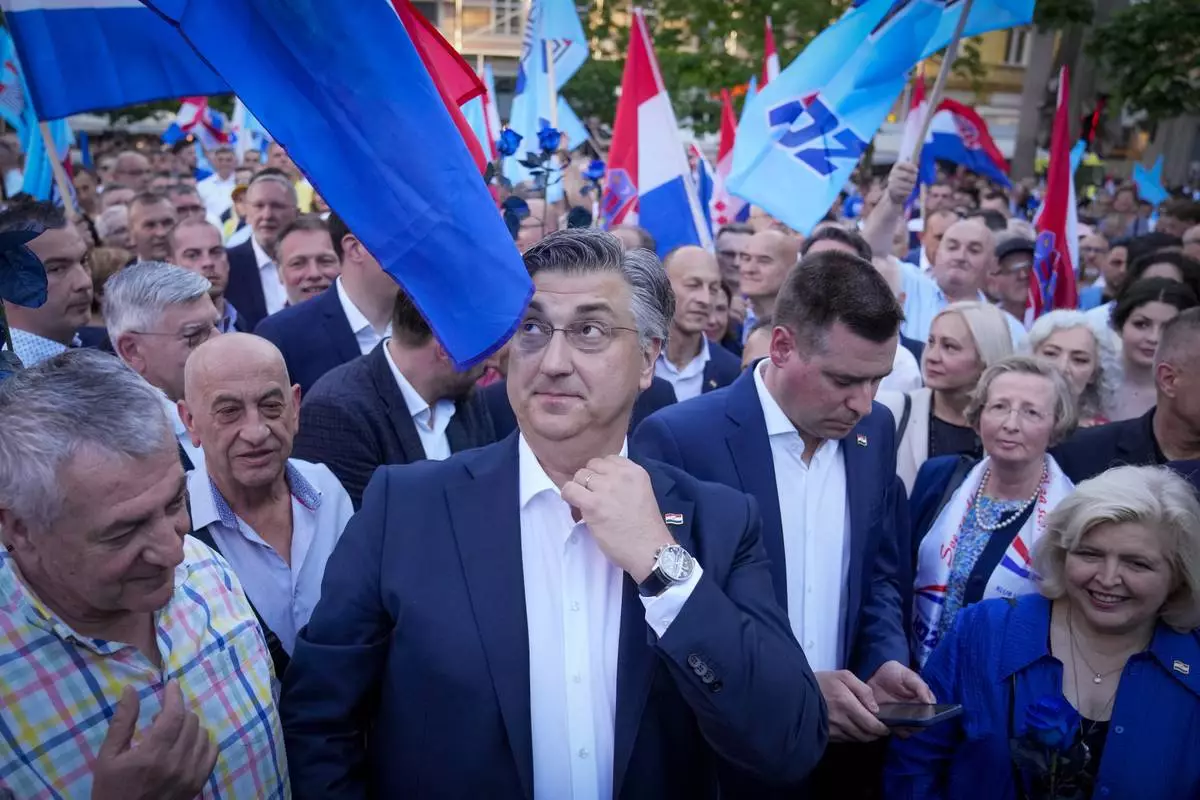
Prime Minister incumbent Andrej Plenkovic, centre, attends his party's rally in Zagreb, Croatia, Sunday, April 14, 2024. Croatia this week holds a parliamentary election following a campaign that was marked by heated exchanges between the country's two top officials, creating a political crisis in the Balkan country, a European Union and NATO member state. (AP Photo/Darko Bandic)
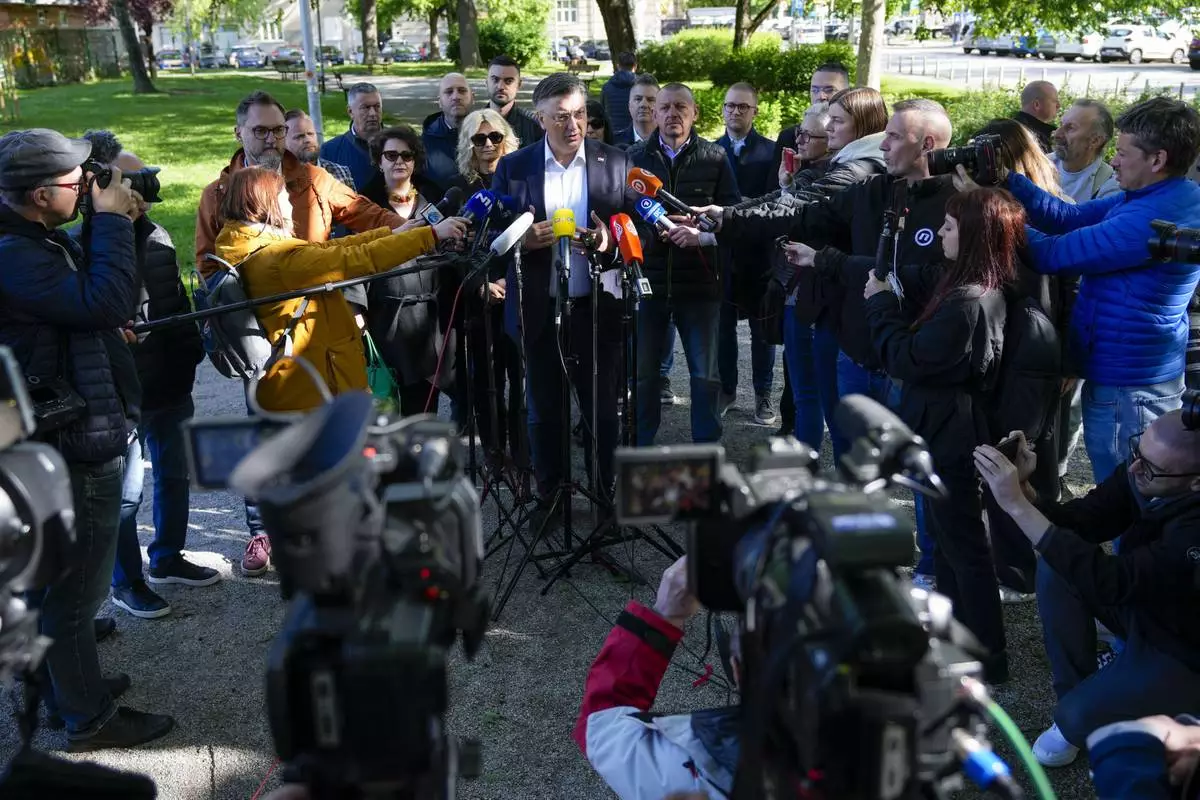
Prime Minister incumbent Andrej Plenkovic speaks to the media after casting his ballot at a polling station in Zagreb, Croatia, Wednesday, April 17, 2024. Croatia is voting in a parliamentary election after a campaign that centered on a bitter rivalry between the president and prime minister of the small European Union and NATO member. (AP Photo/Darko Vojinovic)
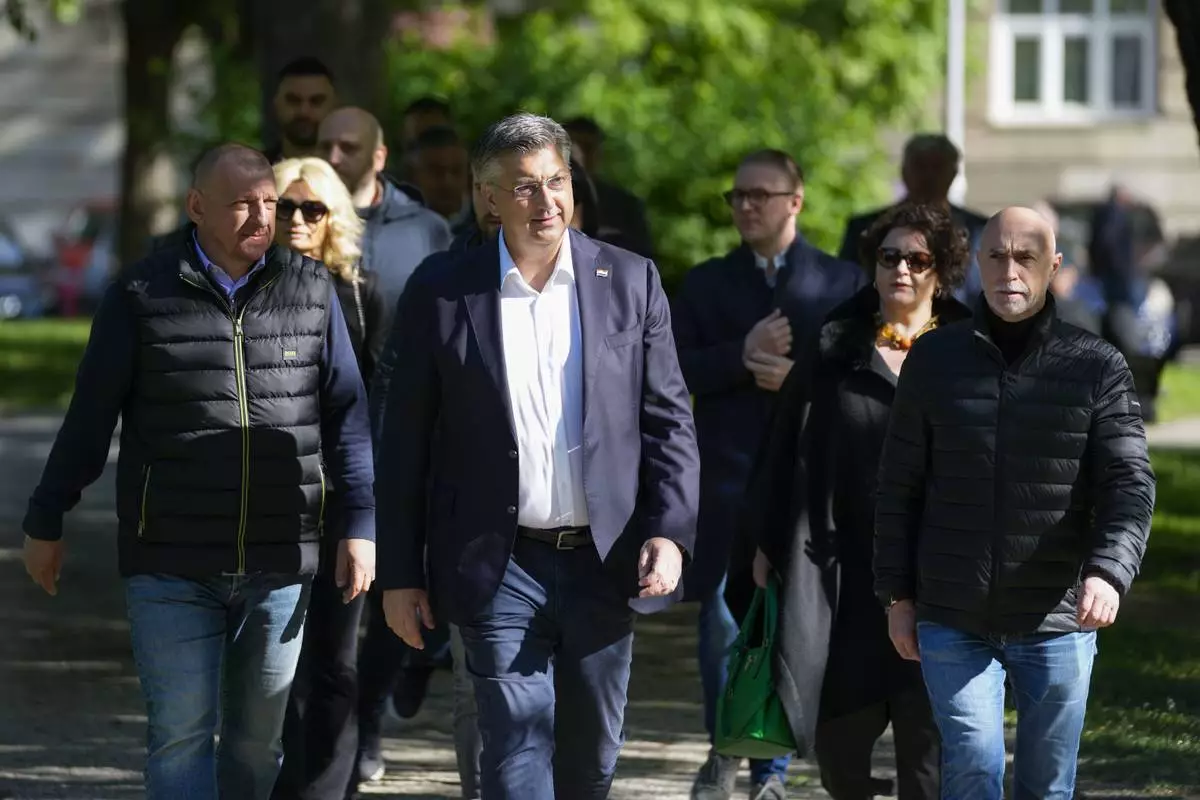
Prime Minister incumbent Andrej Plenkovic, center, leaves a polling station after voting at a polling station in Zagreb, Croatia, Wednesday, April 17, 2024. Croatia is voting in a parliamentary election after a campaign that centered on a bitter rivalry between the president and prime minister of the small European Union and NATO member. (AP Photo/Darko Vojinovic)
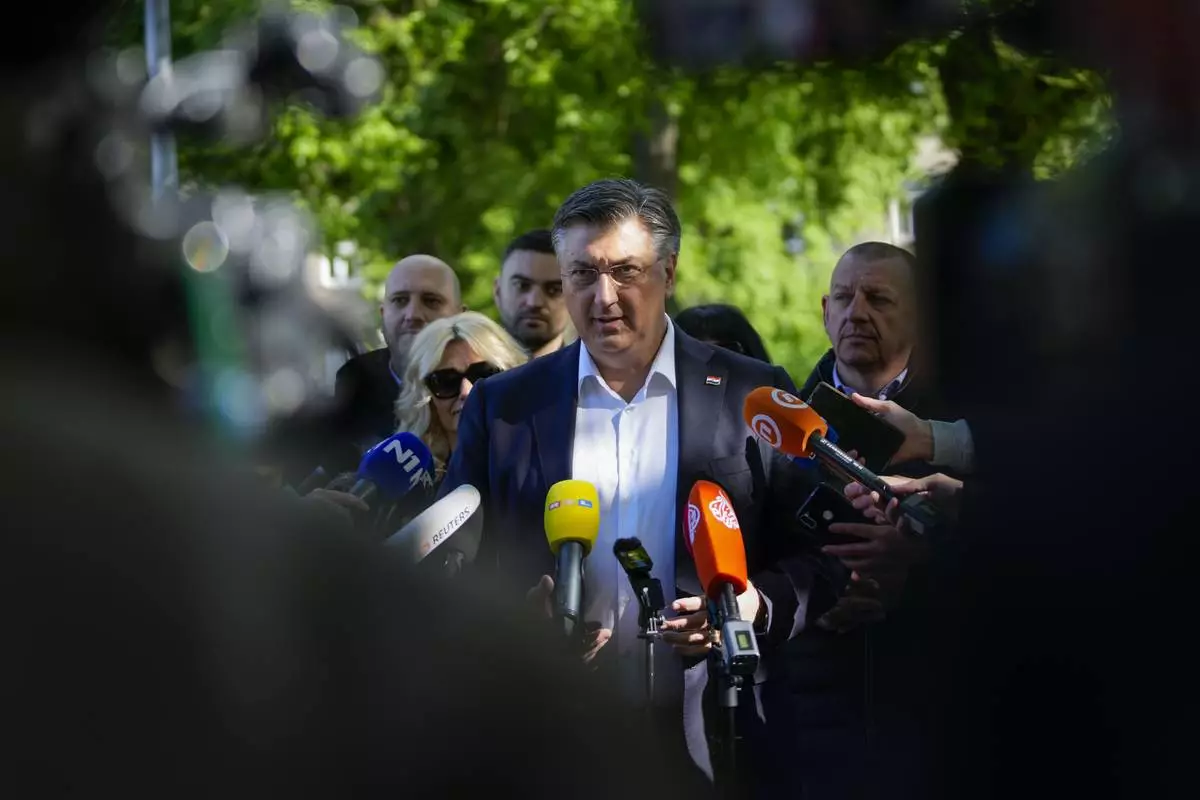
Prime Minister incumbent Andrej Plenkovic speaks to the media after casting his ballot at a polling station in Zagreb, Croatia, Wednesday, April 17, 2024. Croatia is voting in a parliamentary election after a campaign that centered on a bitter rivalry between the president and prime minister of the small European Union and NATO member. (AP Photo/Darko Vojinovic)
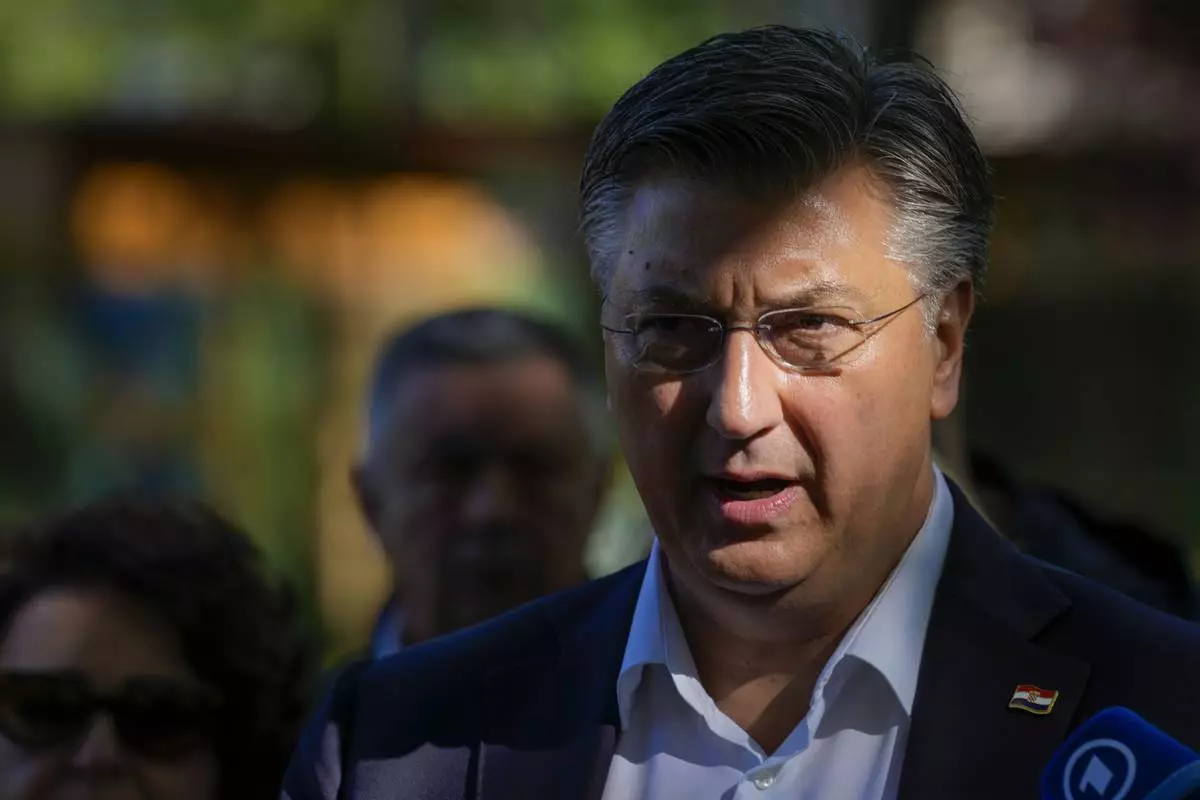
Prime Minister incumbent Andrej Plenkovic speaks to the media after casting his ballot at a polling station in Zagreb, Croatia, Wednesday, April 17, 2024. Croatia is voting in a parliamentary election after a campaign that centered on a bitter rivalry between the president and prime minister of the small European Union and NATO member. (AP Photo/Darko Vojinovic)
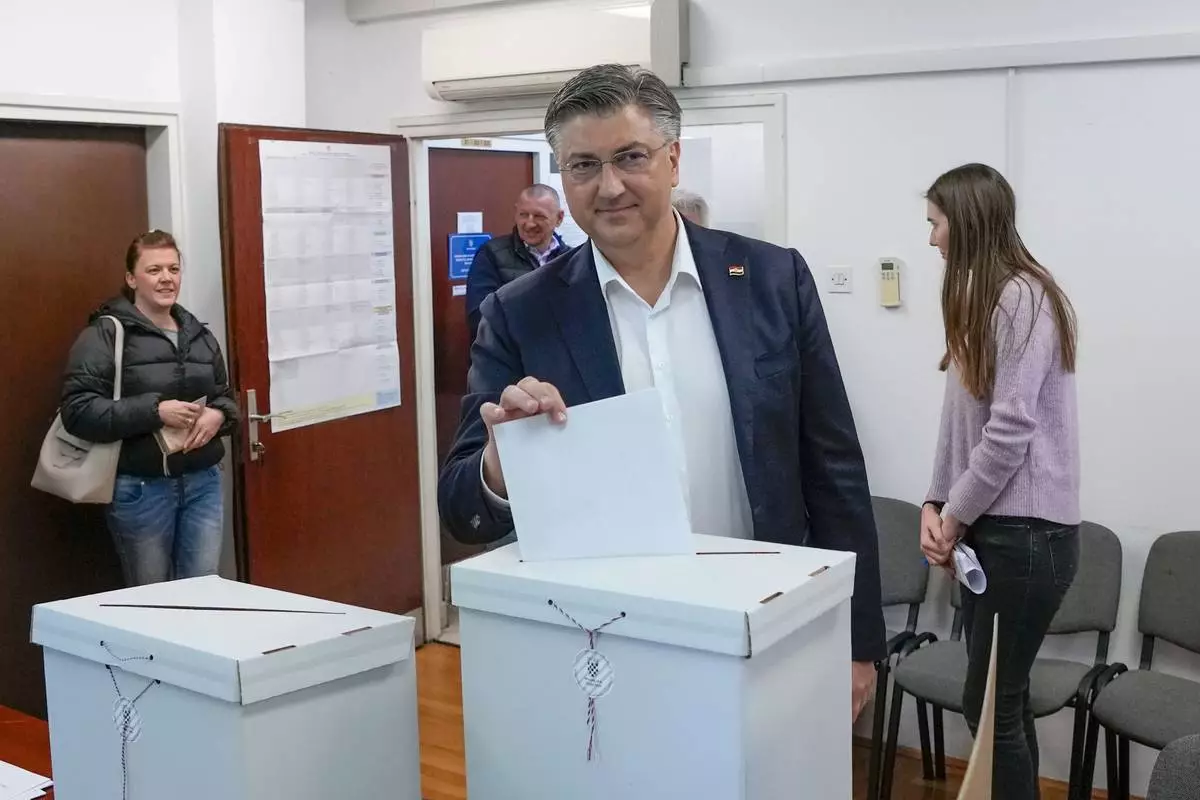
Prime Minister incumbent Andrej Plenkovic casts his ballot at a polling station in Zagreb, Croatia, Wednesday, April 17, 2024. Croatia is voting in a parliamentary election after a campaign that centered on a bitter rivalry between the president and prime minister of the small European Union and NATO member. (AP Photo/Darko Vojinovic)



















